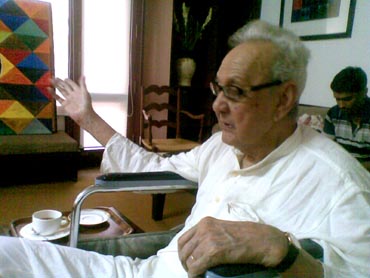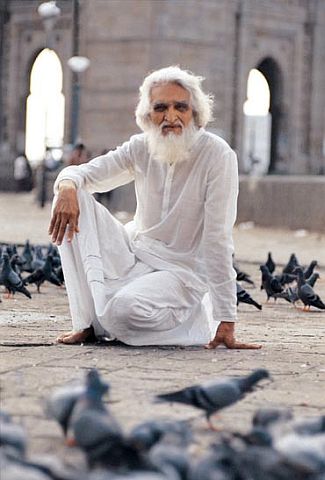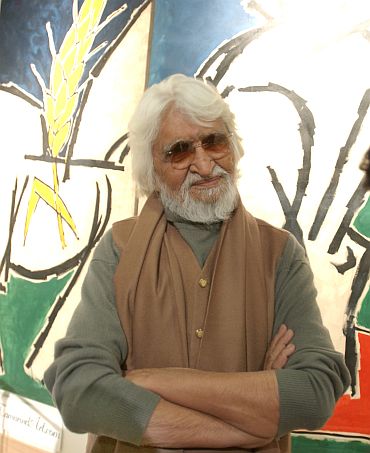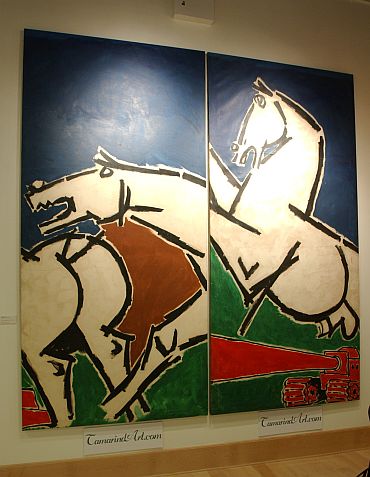 | « Back to article | Print this article |
'Husain left India because he felt insulted'
He does not remember exactly when he had met Husain for the first time, but does say it was in the 1940s in Mumbai. Rediff.com's Sahim Salim talks to Syed Haider Raza, probably the only other Indian artist who can match MF Husain's work, in terms of price.
He sits on his wheelchair with a faraway look in his eyes, hidden carefully with his thick glasses. Syed Haider Raza, chuckles with delight when snatches of memories of Husain come to him.
For an 89-year-old old, Raza's hearing is brilliant. He speaks softly, so softly that he is almost inaudible. One has to strain to understand him and also take help from his secretary, who is kind enough to repeat what the Padma Bhushan awardee says.
"Husain, oh Husain! That man is one of the liveliest individuals I have ever met. He has done remarkable work not only for India, but also for the world. He did contemporary art in relation to tendency for Indian origin and tradition," says Raza.
Click NEXT to read further
'Husain was deeply connected to his roots'
Raza, who returned to live in New Delhi just six months ago, says Husain also dreamed of coming back to India. Raza returned from Paris and has been staying in this sprawling flat in Safdarjung Enclave since January 1 this year.
"I have lived in Paris all through my professional life. But, at heart, I was and always will be an Indian. I wanted to spend the last leg of my life here. I know for a fact that Husain wanted to too. It is a shame that he could not in the end. It is shame that he could not die in the land he was born in," the veteran says, taking a sip of his tea.
When asked the most distinguishing habit of Husain he remembers, pat comes the reply.
"The man was punctual with his Namaz (prayers). It was amazing how particular he was about offering the Namaz all five times in the day. It didn't matter where he was or what he was doing. When the Azan sounded, he prayed. I loved that about him. He has been accused of a lot of things, but he always was deeply connected to his roots; to what defined him," Raza says.
Click NEXT to read further
'I loved him and his art'
Raza is quick to add, "The other aspect was his hard work. He was very sincere about it, and worked extremely hard." Raza recalls the last meeting with Husain. It was December 2009, and both artists had put up a joint show in London.
"It was wonderful," says the master, smiling, "We both had put up our latest works in the show. Husain displayed his series on Mother Teresa. He was in awe of the woman."
When this correspondent asks if he met Husain socially post the show, his smile drops.
"I really wanted to. I had even invited him to come to the gallery after the show so that we could talk over a cup of coffee. Unfortunately, he never turned up. I assume he was busy. There are very few people with whom I can engage in an intellectual conversation and he was one of them" Raza says.
"But we put on a good show. During the show, we exchanged information about art and discussed about new artists and their work. I loved him and his art," Raza adds.
When asked if he kept in touch with Husain over the phone, the artist says, almost venomously, "No. I hate telephones."
Click NEXT to read further
'He was never concerned with the price of his work'
It was in the 1940s, that the who is who of modern day art: Husain, Raza and FN Souza had come together in Mumbai to found the Progressive Artists Group --which combined Indian subjects with post-impressionists style, cubism and expressionist styles.
Raza, Husain and Tyeb Mehta remained close friends during the time.
"It was during this period that I got close to Husain. We interacted on a regular basis and I always told him that his art was special," Raza says.
Almost as an afterthought, Reza adds, "You know, he was never concerned with the price of his work. What was important for him was that he expressed himself. He was adamant on this point. Everyone seems to think we artists are after money. It is not true. True artists are not concerned about it."
When asked which of Husain's paintings is his favorite, he says, "I don't remember the name of the work, but it depicts a woman with an animal. I just love that painting."
"You know it really is regretful that such an artist had to live outside his country. He truly was a master. He had to go because there was threat to his life. Honestly, I think he left because he felt insulted. It is a shame," Raza says.



